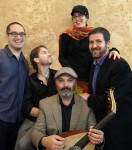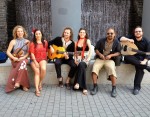The accordion “has gradually and sneakily taken over my life,” says musician David Symons, member of the group Obliquestra. (photo by Stephanie Reed)
“Klezmer, choro, Tin Pan Alley, French musette, German songs, Russian waltzes, and so on” … Obliquestra plays the music they “most wanted to play after being isolated at home for so long” during the pandemic, David Symons told the Independent. The accordionist, singer and composer is one of the three members of the band who will be playing at the Vancouver Folk Music Festival, which takes place July 19-21 at Jericho Beach Park.
Symons will be joined at the festival by Dr. Sick on violin, guitar and musical saw, and Susanne Ortner on clarinet. It will be their first time performing together in Vancouver.
Obliquestra started when live music started returning in 2021, explained Symons. “Dr. Sick, who I had worked with for years in my band The Salt Wives (and one of the most unfairly talented musicians in town) called me up and said there was a new bar opening next door to his house and it would be amazingly convenient to play there every Saturday. I called Susanne Ortner, who I hadn’t played with, but who I knew was a master klezmer clarinetist, though she mainly does Brazilian choro and jazz now.”
They started playing together in Symons’ backyard with banjoist Aaron Gunn and bassist Stoo Odom, “without any concept, really,” said Symons, just playing what they wanted to play.
“I’ve sort of always had this eclectic approach,” he said. “Discreet genres of music are mostly a marketing convenience. Musicians have always played and been influenced by whatever they heard, whatever was available, and whatever the public would pay them to play. Klezmer is a good example of this, being an amalgam of various musical styles from central and eastern Europe and, later, America. I doubt those old school musikers (you wouldn’t call someone a klezmer in those days unless you were trying to get punched) were concerned with notions of ‘authenticity’ or genre. They were playing what they heard and liked, and what their public wanted to hear. We are at least doing the first part of that.”
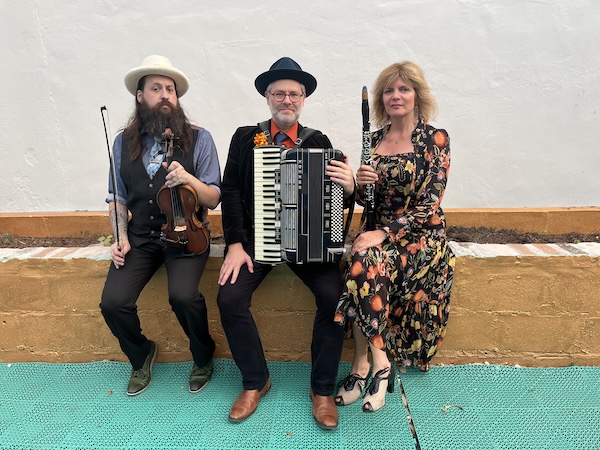
While Symon has “gotten away from klezmer a bit these last few years, really since the pandemic started, mostly for lack of people to play it with,” he said “it’s still the music closest to my heart.”
Why that’s the case, and why he’s also been interested in Yiddish music, despite not being Jewish, is hard to put into words, he said. “In fact, if I could put it into words, maybe we wouldn’t need music. It makes me feel good?”
He said many people assume that a person is Jewish if they play klezmer, and even that it’s a strange thing for a non-Jew to do.
“I’ve always felt this attitude contains an implicit condescension toward the music,” said Symons. “It would never occur to anyone that if someone plays Rachmaninoff they must be Russian, or if they play bluegrass they must be a hillbilly, etc. The music stands on its own merits, whatever one’s ethnic background. Most of the Jewish klezmorim I have known didn’t grow up with the music any more than I did. Still, you have to be careful and respectful. I used to do a lot of Yiddish song and, though I love it, I do less of that now because I realized that, unless I am prepared to devote a few years of my life to learning the language, there’s a lot of nuance that I’m going to miss, no matter how much I work on my pronunciation.”
Symons grew up in rural New Hampshire. “My father plays Latin percussion and guitar, but my folks were divorced and I didn’t see him much, and I had very little interest in music until about 15,” he said. “I was into theatre and acting. Then, I more or less simultaneously discovered Tom Waits and classical music, particularly Beethoven, and suddenly fell in love with music.
“I played guitar for a few years, but the Waits album Frank’s Wild Years convinced me to get an accordion. This was pre-internet in rural New Hampshire, so I put an ad in the local paper asking if anyone had an accordion I could buy. It turned out a lot of people did, and I was very lucky to get something playable. Then, the accordion more or less sat around decoratively for the next couple of years until I happened to see Itzhak Perlman on David Letterman’s show with a bunch of klezmer musicians. He had just released a klezmer album with the top American klezmer bands at the time, and I became obsessed with this music and went down a deep rabbit hole for the next 25 years or so. I taught myself accordion to play klezmer, largely while working in a parking garage in Burlington, Vt., which had nice, cathedral-like acoustics.”
Symons acknowledged, “Of course, no one is truly self-taught – that just means I’ve learned a lot of little things from a lot of different people, without ever having any one teacher or mentor. As for my relationship with the accordion, the damn thing has gradually and sneakily taken over my life. They’ll tell you that you can just pick it up for fun once and awhile and put it down whenever you want, no harm done, but don’t believe them, kids! For many years, I tried to resist accordion clichés and now, in my middle age, I own not one, but two pairs of lederhosen. I started fixing accordions when I moved to New Orleans and there was no one doing it here. Twelve years later, I am sitting in a room in my home with somewhere between 40 and 50 accordions around me, in various states of functionality. The accordions have won.”
About the move to New Orleans, Symons said, “I lived in Vermont for 15 years and was ready for something new. Or, in the case of New Orleans, something old and dirty. I had spent a month in here in 2003 when I was traveling around the country busking in this tiny, ancient Toyota camper. I always thought about going back and trying to live there. Loving New Orleans is like loving a complicated, brilliant, yet self-destructive person. Someone who might be utterly charming one day and destroy a hotel bathroom the next. I still feel like an outsider here most of the time, but I’ve come to terms with that. I’m happy that I’m able to make myself useful to my fellow accordionists by keeping their instruments in working order.”
Symons and his fellow Obliquestra musicians – “Mini-Obliquestra or Obliquestrio,” as Symons quipped – play the folk festival’s South Stage July 21, 11:50 a.m.-12:40 p.m. For the weekend’s full lineup and tickets, visit thefestival.bc.ca.

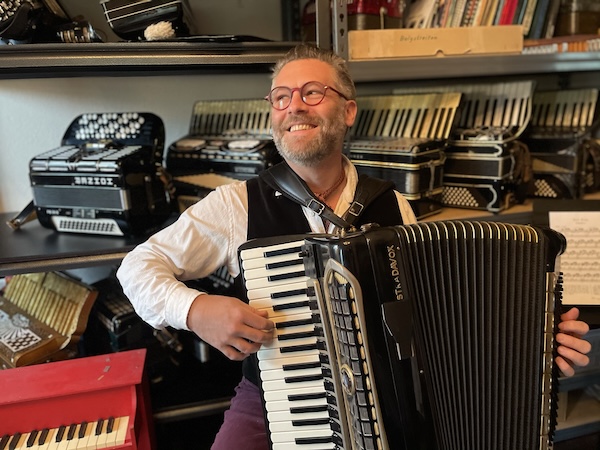
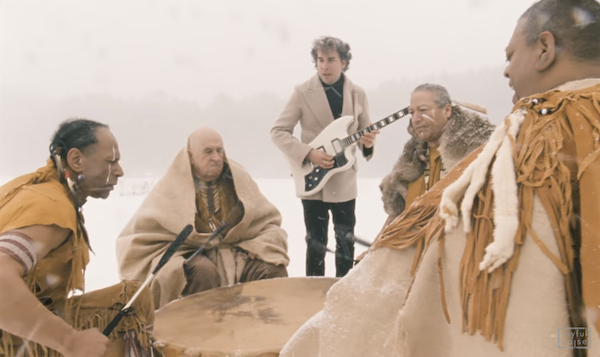
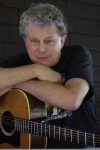
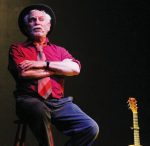
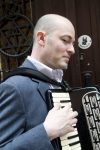
 Many people have appreciated We Are Going to Bremen to be Musicians, it seems. In addition to the recording, Berner created a book of the tale, with illustrations by Tin Can Forest. Tin Can Forest Press’ first printing of it, published in 2015, sold out; the second printing will be available next month.
Many people have appreciated We Are Going to Bremen to be Musicians, it seems. In addition to the recording, Berner created a book of the tale, with illustrations by Tin Can Forest. Tin Can Forest Press’ first printing of it, published in 2015, sold out; the second printing will be available next month.